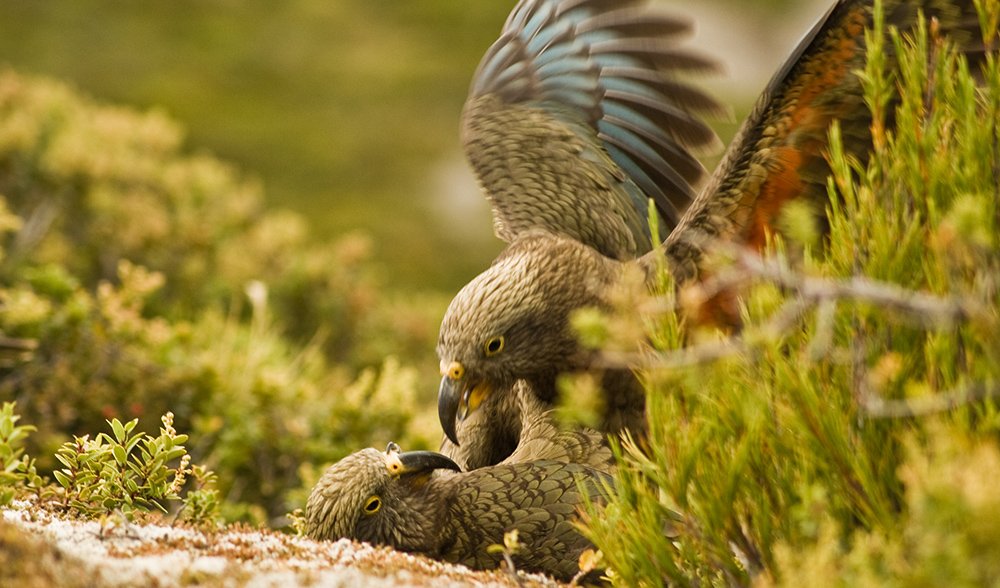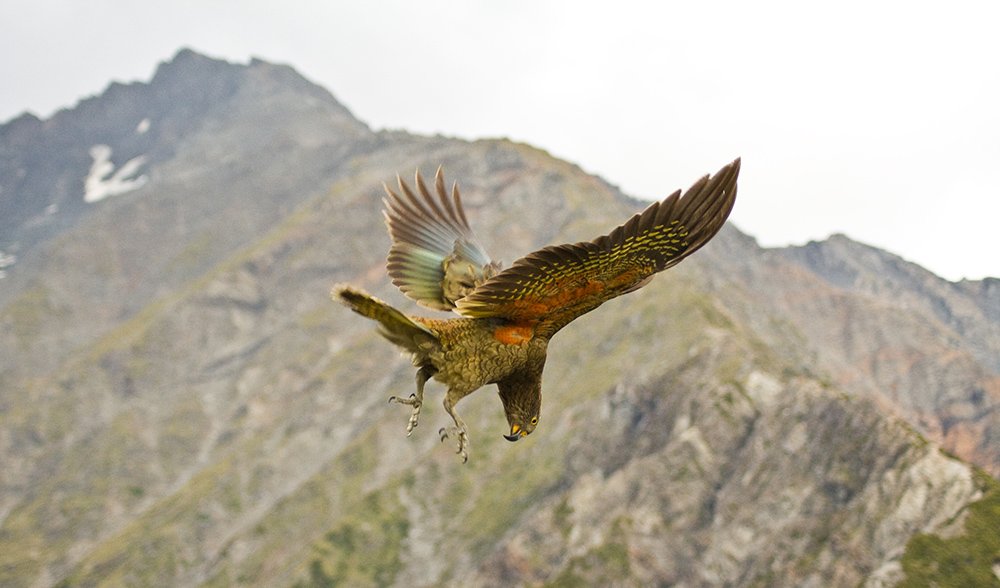Kea playfulness is contagious, study finds

HAVE YOU EVER WATCHED someone laugh and felt an uncontrollable urge to join in? Until now, it’s been thought this type of positive emotional contagion was unique to humans, chimpanzees and rats.
However, new research out this week suggests birds do it too. According to a new study published in Current Biology, when the kea parrot (Nestor notabilis) hears a joyful play call from another parrot it becomes playful itself.
In the study, researchers had previously identified one type of call that was associated with playful behaviour. This play call was recorded and played back to wild kea parrots, along with other control calls that included other kea calls, a call from another local bird and a basic tone. Their results were clear: only the play call caused playful behaviour.
RELATED: Birds’ emotional lives as complicated as ours
“The fact that at least some of these birds started playing spontaneously [after hearing the play call] when no other birds had been playing suggests that, similar to human laughter, it had an emotional effect on the birds that heard it, putting them in a playful state,” said lead author Raoul Schwing from the Messerli Research Institute in Austria.

Specific calls of playing keas trigger playful emotions in other, non-playing birds, just as laughter does for us. (Image: Raoul Schwing/Vetmeduni Vienna)
Clever but naughty
The kea parrot is a notably playful bird, endemic to New Zealand’s South Island where it is a lovable pest, unafraid of humans and famous for its curious and playful behaviour, which has led to their nickname of “the clown of the mountains”.
If you ever see keas in the wild you will see them chase each other in the air, then do spirals and loops, and other tricks, both on air and on land. But they are quite naughty too.
“Keas are just the right meld of destructive and fearless to really annoy people. Any vehicle parked in the high country is prone to be stripped of rubber, and anything else that isn’t bolted or welded down,” said Raoul.
“They steal from tourists day and night. They keep mountaineers awake by rolling stones down the metal roof of the high country huts. They chuck rocks at tourists. They break into houses through cat doors. Garbage cans are ransacked. Antennas are chewed off.”
The kea is also pretty clever, Raoul added.
“The kea are amongst the smartest animals on the planet, scoring in the same range as the smartest primates and corvids on tasks that require them to manipulate objects, make logical inferences or use tools to gain access to a reward,” he said.

The play calls of the kea are no invitation but a trigger to start playing alone or with other non-playing birds. (Image: Raoul Schwing/Vetmeduni Vienna)
An uncertain future
The kea parrot has had a bad reputation since the first European settlers arrived in New Zealand. Although they mostly feed on plants and insects, they are also keen meat eaters, and often scavenge off dead animals, or even kill livestock. This behaviour has cost them dearly.
“From 1870 to 1970 there was a bounty one could collect for every kea shot (the bounty was paid per beak delivered to the local government),” said Raoul. During this period, more than 150,000 birds were killed.
Today less than 3000 kea parrots are found in the wild, mostly due to predation by invasive mammals such as stoats, possums and feral cats. The species is currently considered vulnerable to extinction, according to the International Union for Conservation of Nature. Conservation projects are now underway to protect the bird and avoid a lonely end for this playful creature.
In the meantime, Raoul wants to understand the evolutionary benefit of this shared playfulness. “Our next step is to look into the effects of play on a group of kea, to be able to find a reason why this call would have evolved to increase play,” he said.
READ MORE:
- Drunk birds: inebriation in the wild
- Female fairy-wrens sing for other females
- Cheeky whale shark gets a free feed




